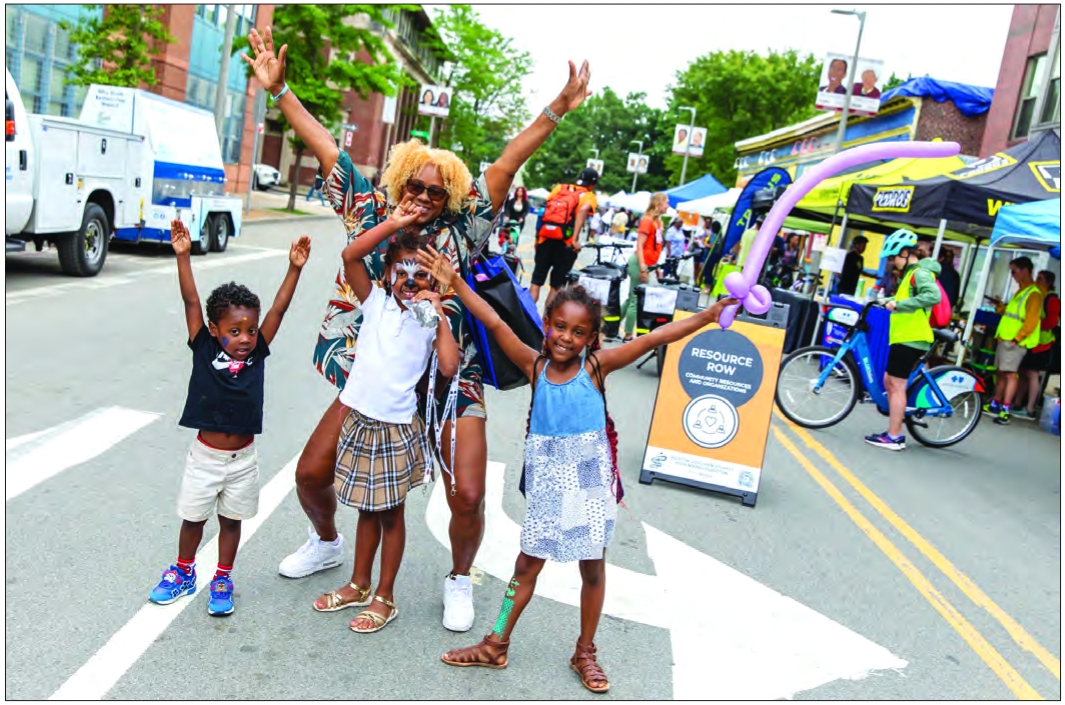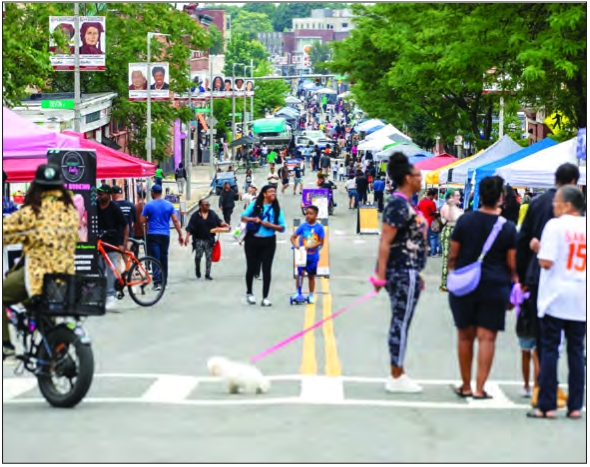
Residents join in the fun during Blue Hill Avenue Open Streets on June 22.

A scene from Blue Hill Avenue Open Streets on June 22.
For six neighborhoods across Boston, this summer marks an opportunity to celebrate local businesses and community organizations as the city converts roadways into public space in its annual Open Streets events.
Now in its third year, the program has grown as the city has added neighborhoods and expanded hours for the events, which shut down major roadways to cars from 10:30 a.m. to 5 p.m. — previously they ran only until 3:30 — to invite pedestrians and cyclists out to enjoy the street as a public space.
“We have seen partnerships form, we have seen small businesses take off, we have seen communities really come together around these special events. Sometimes we don’t remember or think about what it means that streets are public space,” said Mayor Michelle Wu at the March press conference announcing this year’s events.
For the 2024 program, Hyde Park will join the growing roster of neighborhoods with an Open Streets event.
“I remember, last year, saying to myself, ‘Oh, I’m so envious of these neighborhoods that have Open Streets,’” said Thien Simpson, executive director of the Hyde Park Main Streets organization, at the press conference. “When I heard about the possibility of Hyde Park having this event, I was so excited. And when it was official, I couldn’t contain my excitement.”
She said she hopes the Aug. 11 event, which will open the roadway between the intersection of Hyde Park Avenue at River Street and Fairmount Avenue at Davison Street, will bring new visitors to the neighborhood, who will come back for future outings.
City
Council President Ruthzee Louijeune, a Hyde Park resident, said that
the neighborhood is ready for Open Streets, but said that Black- and
brown-owned businesses should make sure they’re represented at the
event.
“It’s going to be really important that we bring everyone to the table,” she said at the press conference.
The
expansion makes for twice as many Open Streets events in the city as
when it launched with in 2022. At its inception, the program was run in
Roxbury, Dorchester and Jamaica Plain. Last year, the city added events
in East Boston and Allston/ Brighton.
“We
launched from three neighborhoods, to five, to now six, because the
community is asking for it,” said Shana Bryant, whose eponymous
consulting firm is contracting with the city to organize the events, at
the press conference.
The
program also includes a series of Open Newbury Street events, where the
Back Bay shopping stretch is shut down weekly on Sundays, from June 30
through Sept. 1.
Along
Centre Street in Jamaica Plain, local business leaders generally work
to make the local economy support itself, said Ginger Brown, who heads
the JP Centre/South Main Streets organization, but the extra visitors
that come for the area’s Open Street event — on July 21 this year — are
nothing to turn one’s nose up at.
“We
concentrate a lot on being a self-sustaining mini-economy, but bringing
in people from other parts of Boston is always a huge boon and
introduces new people to the neighborhood,” Brown said in an interview.
“That, in turn, helps our businesses and community as well.”
In
the past two years, businesses along the stretch of Centre Street have
seen crowds flocking to the almost 1.5-mile-long length of road that
gets opened to pedestrians from the Jackson Square T Stop almost all the
way to Forest Hills.
In
2022, the first year of Jamaica Plain’s Open Streets event, On Centre, a
clothing and gifts store, had to call in extra staff to help customers,
Brown said. Last year, she said The Joint, a burger restaurant along
the route, ran out of beef.
“For
the businesses that were prepared, they still weren’t prepared,” Brown
said. “Rumor has it that for a lot of businesses, it was busier than
Christmas.”
The
businesses and organizations that set up tents and stands along the road
for the events make for an opportunity to have the best of Boston on
display, said Jascha Franklin-Hodge, Boston’s chief of streets, at the
city’s press conference.
“The
local artists, nonprofits, small businesses — everyone who comes out to
participate — is what gives these events their energy, their sense of
celebration,” he said.
Besides
increased sales for businesses along the route, part of the program’s
design is to make, for the duration of each event, that stretch of
roadway more pedestrian-friendly.
“When
we have more access to the streets and we’re relying instead on walking
around and using our bicycles, then it gives us a great example of how
truly great our neighborhood could be without having to rely on cars,”
Brown said.
Franklin-Hodge said he’s watched the impact of the events and the vision they can bring grow since Open Streets was launched.
“Over
the last few years, it’s been so exciting to see Open Streets grow into
a true annual tradition here in Boston,” he said. “Year after year,
thousands of our residents get to experience the streets as vibrant
shared public spaces.”
At
the press conference announcing this year’s events, Wu described how
normally, when crossing the street with her kids, she focused on holding
onto them to make sure they don’t run into traffic — something she
doesn’t have to worry about at the Open Streets events.
“When we take the time to just make the street really open to community, magic happens,” she said.
Louijeune
said she always shows up to the programming with a scooter, something
she fell in love with at an Open Streets event in another city.
“I
hope everyone — your children, your parents, your friends — will fall
in love with something at Open Streets, because it shows us how we can
use streets differently and how we streets really help build community,”
she said.
Even as in
other parts of Boston, like on Newbury Street, the city is pursuing more
regular closures to cars, some of the routes that are featured as an
Open Street event present unique opportunities.
Brown
said she’d love to see more pedestrian-friendly street closures in
Jamaica Plain, but shutting down Centre Street to vehicles on a regular
basis is challenging, given a fire station at one end of the Open
Streets route and two MBTA bus lines through the area that can’t easily
be rerouted.
“I think
it’s a great way to enjoy your city. It slows down the pace of life a
little more, and it actually helps the businesses enormously, because
people then have time to stop and shop,” she said. “We’re never able to
shut [Centre Street] down, so something like this is really great in
Jamaica Plain, because it is so rare for us to do it.”